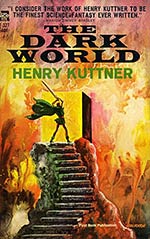
![]() Scott Laz
Scott Laz
6/20/2016
![]()
The Dark World is an excellent example of the sort of rationalized fantasy that was the mainstay of John Campbell's Unknown magazine. (Unknown folded in 1943, and Kuttner's novella first appeared in Startling Stories in 1946.) The titular world is a parallel to Earth, and the occasional interactions between the two are the source of most of Earth's mythology and legends of the supernatural.
Ever since a wartime incident, Edward Bond has felt restless, out-of-place and vaguely uneasy. As it turns out, this is the result of his consciousness having been swtiched with his counterpart in the Dark World--Ganelon, a powerful member of the coven that controls, by way of sorcery derived from mutation, that parallel reality. In a sense, Bond has become Ganelon, but still has Bond's memories; thus his sense of the "wrongness" of his life on our Earth. With the self-interested and power-hungry Ganelon exiled to Earth, the morally upright Edward Bond was sent into Ganelon's body in the Dark World, where he switches sides in the power struggle there, becoming a leader of a rebellion to overthrow the power of the coven and create a free society.
Along with the variety of rationalizations for what we would consider magical or supernatural beliefs and creatures that are derived from the Dark World (gods of various pantheons, sorcery, werewolves, etc.), the other main source of interest in this story is following the first person point of view of Ganelon/Bond. This first-person/people point-of-view is somewhat unique, since the two-in-one characters have different ethical systems and memories, but, having been switched and combined, his/their potential motivations and actions in the Dark World become unpredictable. Will Ganelon prevail and succeed in becoming the ruler of the Dark World, or will Edward Bond return to lead the resistance to victory? Or will the two characters somehow remain merged and produce an unpredictable combination?
This inner battle plays out in the context of a nicely plotted science-fantasy adventure of the sort that Kuttner was a superior practitioner of in his time. All this holds up quite well (and should be especially interesting to anyone interested in the history of SF/fantasy), though it won't seem as original to modern readers as it must have to those who picked up the Summer 1946 issue of Startling Stories. Michael Moorcock and John Cawthorn included The Dark World (along with The Valley of the Flame, also from 1946) in their Fantasy: The 100 Best Books.